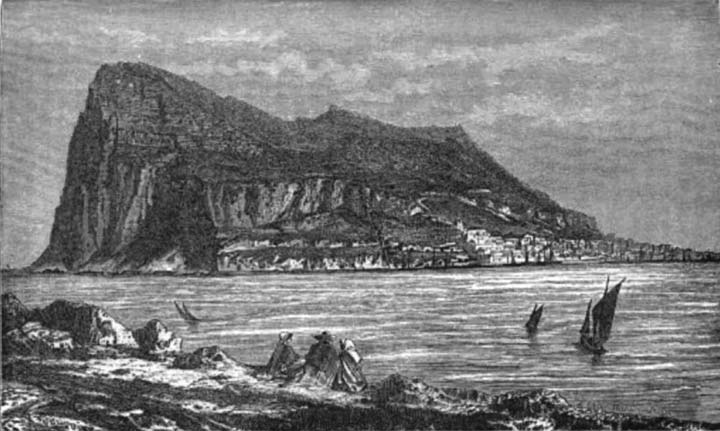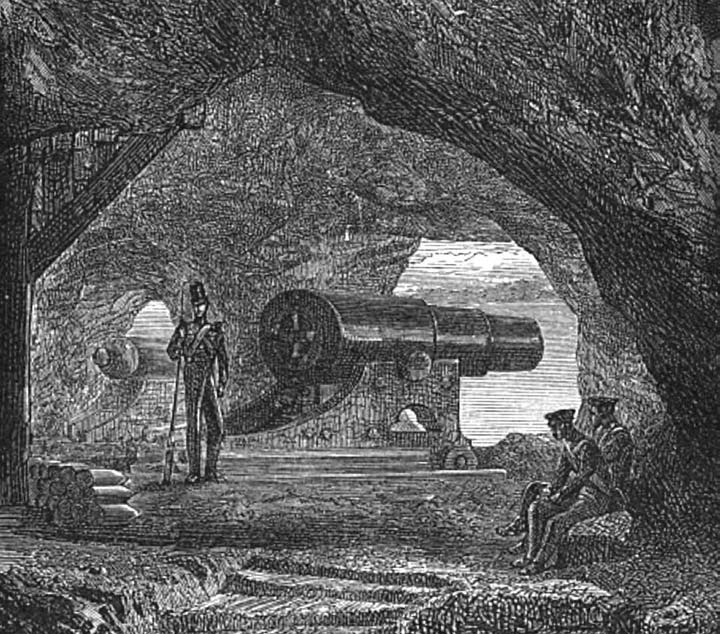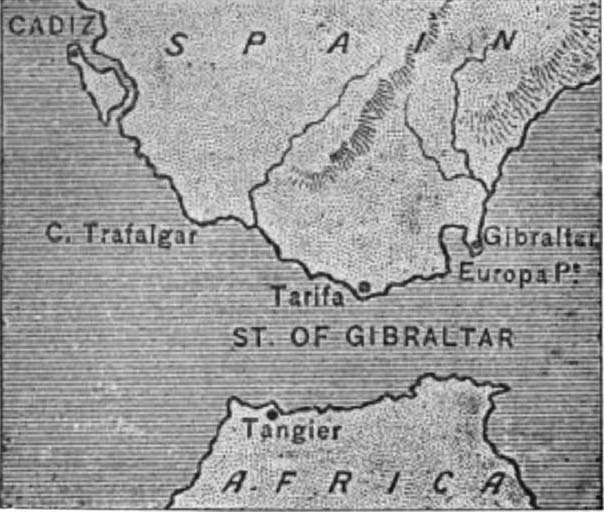





 LESSON 1
LESSON 1

GIBRALTAR
 fell into the hands of the English in 1704, during the War of the Spanish Succession
fell into the hands of the English in 1704, during the War of the Spanish Succession
 —the war in which Marl-borough gained so much glory for the English arms. Admiral Sir George Rooke had been sent to the Mediterranean, to watch the French and Spanish fleets. For a long time he was unable to accomplish anything of importance; but, learning that Gibraltar was very poorly garrisoned, he suddenly attacked and captured it, and hoisted the English flag on its Signal Station.
—the war in which Marl-borough gained so much glory for the English arms. Admiral Sir George Rooke had been sent to the Mediterranean, to watch the French and Spanish fleets. For a long time he was unable to accomplish anything of importance; but, learning that Gibraltar was very poorly garrisoned, he suddenly attacked and captured it, and hoisted the English flag on its Signal Station.
That flag is the only one that has ever floated there since the 23rd of July 1704. Time after time have the Spaniards tried to recover this “key of the Mediterranean;” but every effort has been repulsed most gallantly, and often with tremendous loss to the enemy.
The last attempt they made was the most gigantic and determined of all; and its successful resistance by the English garrison forms one of the most heroic incidents in the annals of modern warfare. It occurred during the struggle which severed from England her North American colonies.
 France recognized the United States as an independent power in 1778, and a war with England was the consequence. In the following year Spain joined France, and Gibraltar was immediately blockaded.
France recognized the United States as an independent power in 1778, and a war with England was the consequence. In the following year Spain joined France, and Gibraltar was immediately blockaded.
The siege which followed lasted three years. Every appliance which experience could suggest, or skill could devise, was brought into requisition. Never before had such tremendous armaments, by sea and by land, been brought against any fortress. Yet the garrison held out bravely; and twice their friends outside—once by Admiral Darby, and once by Rodney—succeeded in sending them reinforcements and supplies.
Early in 1781, there was a terric bombardment of the place; but so effectual was the shelter afforded by the casemates,
 or bomb-proof vaults, that the garrison lost only seventy men. In November of the same year, General Elliot, who conducted the defence, headed a midnight sortie, which annihilated the entire line of the enemy’s works. Their floating batteries were at the same time destroyed with red-hot balls. That one night cost the Spaniards two millions sterling!
or bomb-proof vaults, that the garrison lost only seventy men. In November of the same year, General Elliot, who conducted the defence, headed a midnight sortie, which annihilated the entire line of the enemy’s works. Their floating batteries were at the same time destroyed with red-hot balls. That one night cost the Spaniards two millions sterling!
But the final effort was made in 1782, when the Duke de Crillon, flushed with his success in capturing Minorca, took the command of the besiegers. He had under him upwards of 30, 000 of the best troops of France and Spain, and his heavy guns amounted to the then unprecedented number of one hundred and seventy. The combined fleets numbered forty-seven sail of the line, with ten great floating batteries—the contrivance of a French engineer, and deemed invincible, —and frigates, gun-boats, mortar-boats and small craft without number. The besieged numbered only 7000 men with eighty guns.
The siege attracted the interest of the whole civilized world. Two French princes joined the besiegers’ camp, to witness the fall of the place. “Is it taken?” was the first question asked each morning by the King of Spain. “Not yet; but it will be soon,” said his courtiers: and still Elliot’s guns thundered defiance from the Rock.
At length, on the morning of the 13th of September, the grand and decisive attack commenced. The ten battering-ships bore down in admirable order to their several stations. The Admiral, in a two-decker, moored about nine hundred yards off the King’s Bastion.
 The other vessels took their places in a masterly manner, the most distant being eleven hundred or twelve hundred yards from the garrison. Under shelter of the walls, furnaces for heating shot had been lighted; and, from the instant the ships dropped into position, a continuous fire of red-hot balls was directed upon them by the garrison.
The other vessels took their places in a masterly manner, the most distant being eleven hundred or twelve hundred yards from the garrison. Under shelter of the walls, furnaces for heating shot had been lighted; and, from the instant the ships dropped into position, a continuous fire of red-hot balls was directed upon them by the garrison.

VIEW OF GIBRALTAR
In little more than ten minutes, continues Drinkwater, the enemy were completely moored, and their cannonade then became tremendous. The showers of shot and shell which were directed from their land-batteries and battering-ships, on the one hand, and, on the other, the incessant fire from the various works of the garrison, exhibited a scene of which neither the pen nor the pencil can furnish a competent idea. It is sufficient to say that upwards of four hundred pieces of the heaviest artillery were playing at the same moment—a power of ordnance which up till that time had scarcely been employed in any siege since the invention of those wonderful engines of destruction.
After some hours’ cannonade, the battering-ships were found to be no less formidable than they had been represented. Our heaviest shells often rebounded from their tops, whilst the thirty-two pound shot seemed incapable of making any visible impression upon their hulls. Frequently we flattered ourselves that they were on fire; but no sooner did any smoke appear, than, with the most persevering intrepidity, men were observed applying water from their engines within, to those places whence the smoke issued.
Though vexatiously annoyed from the isthmus,
 our artillery directed their sole attention to the battering-ships, the furious and spirited opposition of which served to excite our people to more animated exertions. A fire more tremendous, if possible, than ever, was therefore directed upon them from the garrison. Incessant showers of hot balls, carcasses,
our artillery directed their sole attention to the battering-ships, the furious and spirited opposition of which served to excite our people to more animated exertions. A fire more tremendous, if possible, than ever, was therefore directed upon them from the garrison. Incessant showers of hot balls, carcasses,
 and shells of every species, flew from all quarters; yet, for some hours, the attack and defence were so equally maintained as scarcely to indicate any appearance of superiority on either side. The wonderful construction of the ships seemed to bid defiance to the powers of the heaviest ordnance.
and shells of every species, flew from all quarters; yet, for some hours, the attack and defence were so equally maintained as scarcely to indicate any appearance of superiority on either side. The wonderful construction of the ships seemed to bid defiance to the powers of the heaviest ordnance.
In the afternoon, however, the face of things began to change considerably. The smoke which had been observed to issue from the upper part of the flag-ship appeared to prevail, notwithstanding the constant application of water; and the Admiral’s second was perceived to be in the same condition.
As night came on, the flames fairly gained the ascendant. The confusion which reigned on board of these vessels soon communicated itself to the whole line. The fire of the battering-ships gradually slackened: that of the garrison, on the contrary, seemed to become more animated and tremendous.
It was kept up during the entire night. At one in the morning, two of the ships were entirely a prey to the flames. It was not long before the others also caught fire, either from the operation of the red-hot balls, or, as the Spaniards afterwards alleged, because they set them on fire themselves, when they had lost all hope of saving them. It was then that trouble and despair broke out in all their violence. Every moment the Spaniards made signals of distress, and fired off rockets to implore assistance.
All their boats were immediately sent off, and surrounded the floating gun-ships, in order to save their crews—an operation executed with extreme intrepidity, in spite of perils of every sort. Not only was it necessary for the men to brave the artillery of the besieged: they had also to expose themselves to almost inevitable burning in approaching the flaming vessels. Never, perhaps, did a spectacle more horrible—more deplorable—present itself to the eyes of men. The profound darkness that covered the earth and the sea intensified, by contrast, the lurid flames; and the shrieks of the victims were distinctly heard by the garrison, in the intervals of their cannonade.
A fresh incident arose to interrupt the succour carried to them, and to redouble the terror and confusion. Captain Curtis, a sailor as daring as he was skilful, suddenly advanced with his gun-boats, which had been constructed to confront those of the Spaniards, and each of which carried in front an eighteen or twenty-four pounder. Their fire at water-level rendered them exceedingly formidable; and they were disposed by Captain Curtis so as to take the line of floating batteries in flank.
From that moment the position of the Spaniards became terribly critical. The boats no longer dared to approach them, but were constrained to abandon those enormous machines, so lately the objects of their admiration, to the flames, and their companions in arms to the mercy of an enraged enemy. Several of them were seen to founder. Others only escaped by forced rowing. A few sought shelter by the land during the night; but, on the appearance of daylight, they were easily captured by the English.
Then was witnessed, in all its horrors, a scene, the most harrowing features of which had hitherto remained concealed. In the midst of the flames appeared unhappy wretches, who, with lond shrieks, implored compassion, or precipitated themselves into the waves. Some, on the point of drowning, clung with weakened grasp to the sides of the burning vessels, or floated at hazard on fragments which they chanced to encounter, and, in the agony of desperation, convulsively implored the compassion of their victors.
Touched by this deplorable spectacle, the English listened to humanity alone, and ceased their fire, to occupy themselves solely with the rescue of their enemies; a proceeding the more generous on their part, as they thereby exposed themselves to the most imminent hazard. Captain Curtis, in particular, covered himself with glory, by prodigally risking his own life to save those of his fellow-creatures. Some of his own men were wounded in this honourable enterprise; others were killed; and he himself narrowly escaped from partaking the fate of a ship which blew up at the moment when he was about to board her. More than four hundred of the enemy’s troops were rescued by this intrepid sailor from certain death!

SUBTERRANEAN GALLERY, EXCAVATED OUT OF THE SOLID ROCK
The greater number of the famous battering-ships were either blown up or burnt. The Spanish Admiral quitted his flag-ship a little before midnight, as did also D’Arcon, the French engineer, that on board of which he had embarked to witness the triumph of his contrivances.

Meanwhile, the most intense anxiety as to the fate of Gibraltar prevailed in England. Admiral Howe had sailed from Portsmouth with a convoy containing fresh troops and provisions, and a fleet of thirty-four sail of the line. Relieved by the news of Elliot’s brilliant victory, which he received off the coast of Portugal, he steered direct for the Straits, and succeeded in bringing the whole of his transports to their destination, even in presence of the enemy’s fleets. Thus Gibraltar was saved, and the continuance of the blockade till the peace (Jan. 20, 1783) was little more than a form.
accomplish, perform.
annihilated, destroyed.
anxiety, solicitude.
appliance, contrivance.
armaments, forces.
blockaded, invested.
brilliant, splendid.
cannonade, sustained fire.
capturing, seizing.
competent, adequate.
continuance, prolongation.
contrivances, inventions.
convulsively, spasmodically.
decisive, final.
defiance, contempt for an enemy.
destination, haven.
destruction, devastation.
enterprise, exploit.
executed, performed.
formidable, dangerous.
gigantic, stupendous.
imminent, threatening.
importance, moment.
incapable, unable.
incessant, ceaseless.
inevitable, unavoidable.
intensified, made greater.
interrupt, hinder.
intrepidity, daring.
invincible, invulnerable.
ordnance, cannon.
precipitated, cast.
prodigally, generously.
recognized, acknowledged.
reinforcements, fresh troops.
repulsed, driven back.
requisition, operation.
resistance, defeat.
slackened, declined.
sortie, sally.
tremendous, overwhelming.
unprecedented, unparalleled.
When and how did Gibraltar fall into the hands of the English? When did the Spaniards make the most determined effort to recover it? How long did the siege last? How often during that time was the garrison succoured? What was done in 1781? When was the final effort made? Who took the command of the besiegers? How many men had he? To what did the combined fleets amount? What was the strength of the garrison in men and in guns? What is the date of the decisive attack? Upon what had the besiegers placed most reliance? What proved the great strength of these ships? How were they at length destroyed? What movement compelled the Spaniards to abandon them? What humane service did Curtis afterwards render? Who brought fresh troops and provisions from England to the garrison? When did the blockade finally terminate?